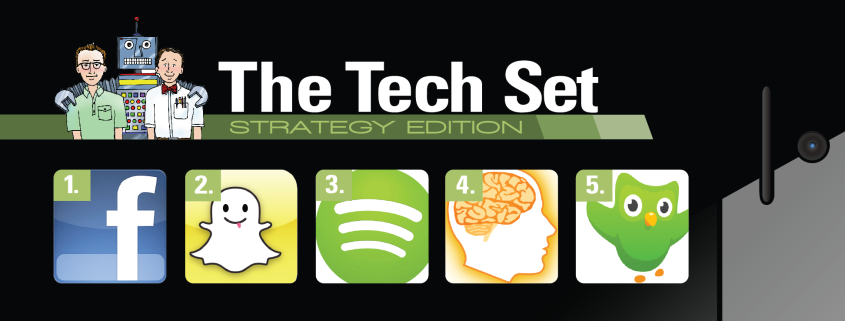The Tech Set: Fast Strategy in a Mobile World
How Five High-Octane Apps Accelerated to Success in the Fast-Paced Mobile Landscape
You might say the “information age” was in full swing when people started checking their email more often than their actual mail… probably at some point in the mid to late 90’s. But things have changed a lot since then: mobile computing boomed, wireless internet exploded, cell phones multiplied like fruit flies and gradually mutated into the ubiquitous personal gateway to the universe we call “The Smart Phone.”
Yes, the information age just refused to stay put. It’s with us every day now—every hour, every minute, in our pockets, in our heads and in our lives. And it’s no accident.
The minds behind the apps that keep us connected (if not addicted) have had to weather the ever-fickle technological landscape while responding to equally erratic consumer demand. They’ve had to be quick. They’ve had to be smart. And, despite the challenges, they’ve enabled us to take control of our digital livelihoods like never before.
So let’s look at life in the mobile-tech fast lane, with five of the most successful smart phone apps to date.
Facebook Mobile
In the mid 2000’s Facebook rose like a Phoenix from the ashes of the social network wars. Mark Zuckerberg’s platform offered a more intuitive, more graphic and (at that time) less commercialized alternative to competitors like MySpace. And once everyone had decided on Facebook, things just pretty much stayed that way.
I mean, if that girl/guy you met at the bar is on Facebook, there’s no reason to be on MySpace. Right?
Scarcely a year after Facebook emerged as the social networking kingpin, Apple unleashed the iPhone… and Facebook was there: ready, willing and able to make the transition from our desks and laps to our palms and pockets. It may have been the best move Zuckerberg ever made. By parlaying his newfound success in the PC field, he was able to able to attain unquestioned dominance in the mobile field. Literally overnight.
Facebook Mobile is now the most downloaded piece of software ever. And even as newer, more “en vogue” social media phenomena come and go, Facebook continues to maintain its status as the de facto foundation of everyone’s online presence. Everything links back to it, everything gets reposted on it. So, even if it’s often just an afterthought these days, Facebook’s still always there. And it will continue to be there for at least the foreseeable future.
SnapChat Mobile
Ever wish you hadn’t posted that photo? Left that comment? Sure, you could delete it. But everyone would know you deleted it. With so many eyes on our social media activity, it’s no wonder we’ve become more and more careful over the years.
But who wants to be careful? That’s were SnapChat comes in…
Looking closely at the tensions surrounding “post permanence,” SnapChat founders Evan Spiegel and Robert Murphy devised a concept in which posted content disappears after a certain amount of time. SnapChat’s popularity exploded last year, attracting almost 30 million members, and, of all things, a cash offer of 3 billion from Mark Zuckerberg himself.
Extraordinary as that all is, it’s even more extraordinary that Spiegel turned down the offer. More extraordinary still, is the fact that Snapchat (as is often the case with internet startups) does not currently generate any revenue!
So how is a company with zero profit worth $3 billion in the eyes of Mark Zuckerberg? Traffic.
By attracting so many sets of eyes from so many different parts of the world, SnapChat’s value is unquestioned. Certainly, there are a lot of ways it could generate profit—ads, links, etc. But that’s not even the point. From Zuckerberg’s point of view, SnapChat’s traffic is traffic that could potentially go to Facebook. So, simply by taking share away from the leader, SnapChat has created immense value for itself. Even without any revenue.
Spotify Mobile
Many of us remember the days of Napster. When the Internet was still a wild west of sorts… bereft of parental controls, Justin Bieber videos, law, order and decency.
Not that that was, uh, good… but anyway…
What began with the mass-piracy of bootleg MP3 files gradually evolved into the perfectly legit dollar-a-download iTunes Music Store. But even one dollar per song can get expensive after a while.
In the spirit of “free,” Internet radio services like Pandora cropped up. But still, those formats lacked the searchable specificity that the iTunes store offered. The solution? Spotify—a fully searchable collection of fully legitimate music online. All for free. And, as of a month ago, it’s now all available on your mobile device. It really is the best of all worlds.
But Spotify didn’t stop there. Founders Daniel Ek and Martin Lorentzon realized that sharing was a big part of modern music appreciation. And, in the age of social media, what better way to share than Facebook? With full Facebook integration, Spotify users can share their tastes in music with… everybody else. And, in turn, everybody else can see what they’re missing and sign up for Spotify ASAP.
Not surprisingly, the plan worked. By 2013, Spotify had well over 20 million users worldwide. Spotify continues to grow, edging out Pandora with more robust features, services and song selections.
Lumosity Mobile
What consumer ever says, “I’m not smart enough”?
As Lumosity, the key player in the emerging field of online brain training, might tell you… not many. But to Lumosity (and their consumers, apparently) it’s not about playing catch up. It’s about unlocking your potential and discovering what your brain can really do. Sounds better, right? After all, we all have oodles of potential. If only we had something to help us find it…
Savvy positioning helped Lumosity overcome the conceptual challenges of their unique product—essentially a suite of online “games” designed to stimulate the mind and facilitate cognitive growth. And besides, who doesn’t like to play games? On a smart phone? Especially when you’ve got a few minutes of downtime here and there?
Lumosity saw the writing on the wall—the biggest market for games these days is the mobile market. No, we’re not talking Red Dead Redemption or Grand Theft Auto. Just fun little time wasters that come in handy when you’ve got a few minutes to kill. Only Lumosity’s games aren’t a waste of time. They’re self-improvement. They’re responsible… yet fun. They’re the multimedia equivalent of healthy candy.
Following its mobile launch in June of 2013, Lumosity saw a 250% increase in membership with 20 million downloads in less than three months. Suffice to say, “brain training on the go” sells. And it sells quite well.
Duolingo Mobile
Gamification, or turning something functional into a semi-competitive form of recreation, is one of the few things that seems to capture, and hold, the interest of millennial Americans. I mean, we all grew up on some permutation of Nintendo, we all have smart phones… it makes sense, right? Just look at Lumosity—who would have thought 20-somethings would willingly participate in cognitive calisthenics?
Picking up where Lumosity left off, Duolingo, 2013’s App of the Year, is extending the fun-and-games approach to the language-learning arena. But Duolingo isn’t just a “gamy” version of Rosetta Stone. It offers something more.
Well, actually, it offers something less… as in, no price tag.
Yes, it’s completely free—whereas more mainstream language-learning software commands a hefty price tag and is markedly less fun. The secret to Duolingo’s costless-ness lies in its ability to cross-reference actual Internet content, in multiple languages, so that every time you translate something, you’re translating something that’s actually on the Internet.
When all’s said and done, Duolingo users are, in essence, providing translation services for websites like Buzzfeed and CNN—all of whom pay Duolingo a fee for their… ahem, your… services.
As of 2014, Duolingo has over 20 million users and received the distinct honor of being the first educational app to receive Apple’s “App of the Year” award. Plus, the more users Duolingo recruits, the more of the Internet gets translated. Duolingo claims that, theoretically, a mere 1 million users could translate every word of content on the English Wikipedia in as few as 90 hours.
All I have to say is, ajabu… which means “amazing” in Swahili.
Have you discovered a new mobile app that’s going to be the “next big thing”? Got an idea for one? Let us know! Leave a comment on the Accelerator blog and let’s get the discussion started…
As a member of Seed’s copywriting team, Matt Donahue marries his love for creative writing with a keen interest in product innovation, technology and science. He’s a graduate of Seton Hill University’s “Popular Fiction” master’s program and writes whenever he can.
P.S. You can follow Seed Strategy on our LinkedIn, Twitter, Facebook and Instagram pages.










